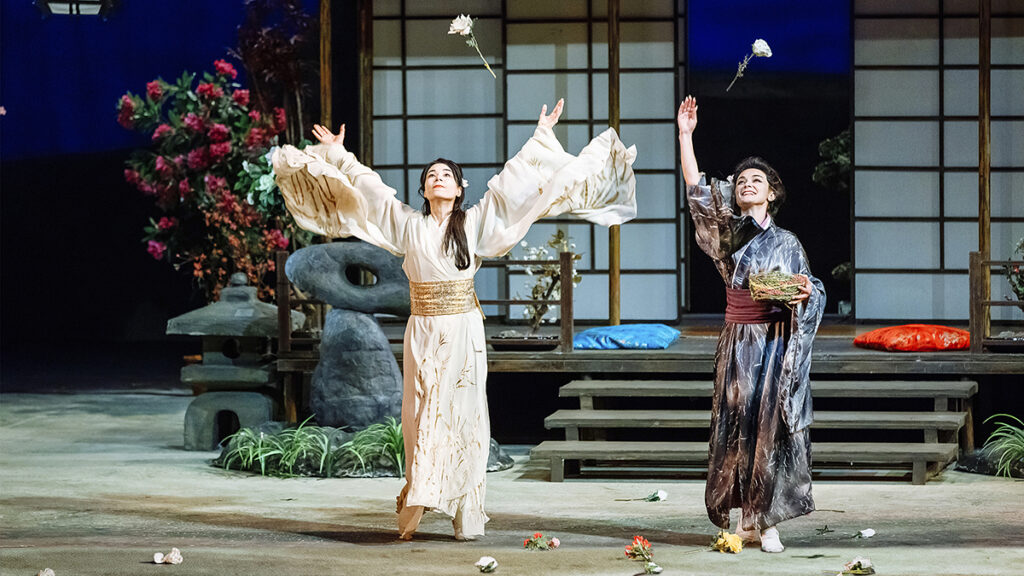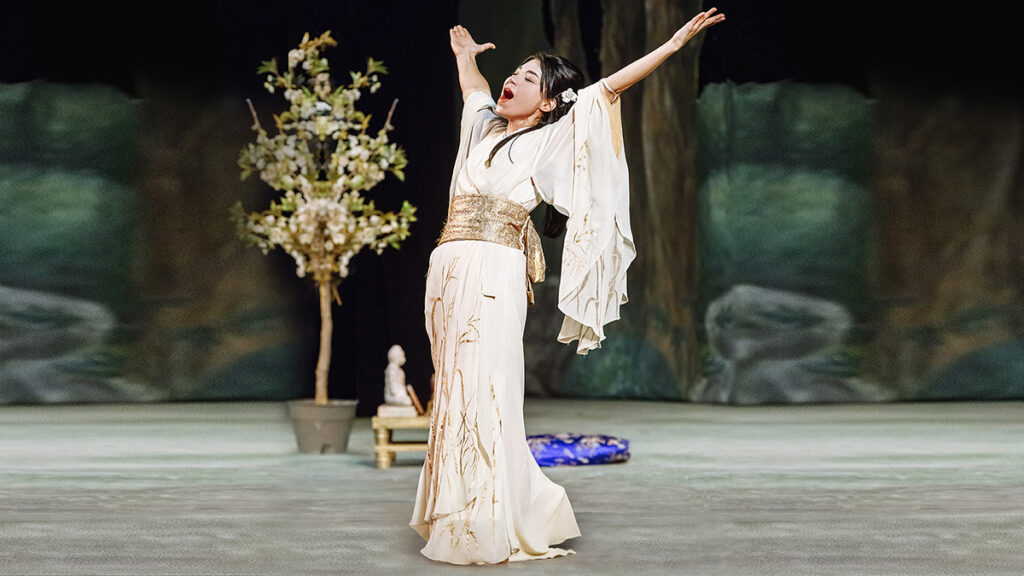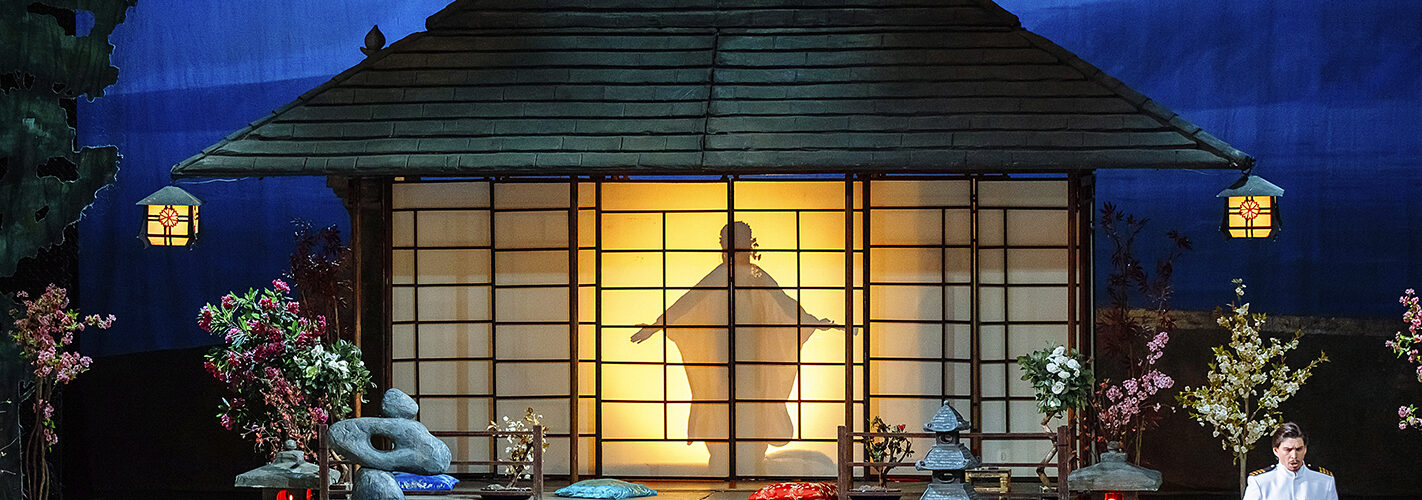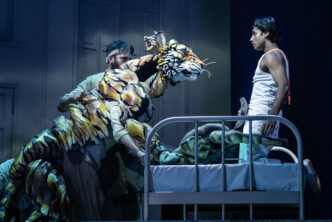Puccini’s Madama Butterfly continues to pull the crowds; partly, of course, because of the maestro’s music, but also because it is a simple, truthful story, based (albeit at some creative distance) upon real life events.
The entire opera is set at the very beginning of the twentieth century, with a single set – a small, paper and bamboo, traditional Japanese house, on a hill overlooking Nagasaki harbour. A young American naval officer, B.F. Pinkerton, awaits the arrival of his even younger Japanese bride-to-be, Cio-Cio San, known to one and all as Butterfly. Fifteen-year-old Butterfly (obliged to work as a geisha since her family fell on hard times) has sparked a burning desire in Pinkerton yet, even as he rhapsodises over his Japanese “prize”:

She is small and delicate, like a crystal figurine, he is already anticipating getting himself an American bride once he’s back home.
The guest of honour, Sharpless, the American Consul, betrays a tender regard for Butterfly, warning his young compatriot: “Be careful: she trusts us”.
Utterly besotted with her tall, strong American, Butterfly has converted to Christianity in his honour. Her family and friends, outraged by her rejection of their beliefs, turn their backs on her.
Despite proclaiming herself, ‘abandoned but happy’, Butterfly nevertheless is coy and fearful once alone with her newly contracted “husband”. She knows how completely her fate now lies in the hands of this virtual stranger from a faraway land.
As act one concludes, Pinkerton seduces his fragile bride, promising her – with thoughtlessly cruel irony:
Love does not destroy.
Act two sees Butterfly and her faithful maid, Suzuki (played with forceful dignity by Natalia Matveeva) waiting patiently for Pinkerton to return to Nagasaki. He went back to America shortly after the wedding – now some three years past. Madama Butterfly – steadfastly insisting on being called Madama Pinkerton – refuses to accept her “marriage” is over, holding firm in her belief that, ‘one fine day’, her husband will come back to her.
Now eighteen, she is not without suitors – some of them wealthy – but she declines all offers. Why would she be seeking a husband when she already has one? She also has a blue-eyed son and, in the end, it is news of this child, not love for the mother, which draws Pinkerton back; with tragic consequences.
The Ellen Kent company have been touring productions featuring largely Eastern European singers for many years, now. As before, this cast features some fine singers. As well as Matveeva, Olexandr Forkushak gives us a humane and thoughtful Sharpless, sung with considerable gravitas. Pinkerton is a difficult role – how to add texture to callous and frankly lustful self-interest, and then, in act three, how to layer ruthless cruelty with believable human sensitivity. Vitali Liskovetskyi works hard throughout, and to decent effect.
In amongst this largely Ukrainian ensemble, Korean soprano, Elena Dee, constructs a noble and heart-rending Butterfly, blending grace and naive vulnerability with resolute devotion to honour and duty. The audience loves her and rightly so.

It’s hard to avoid the sense that there are voices here that could lift these productions to another level. A fresh-eyed designer would help (the company’s sets are becoming wearily traditional), but most of all, a skilled and ambitious theatre director, someone who could guide the cast in understanding and developing the inner lives of their characters. Singing at the house must give way to addressing and engaging with each other – this is where the true drama of opera lies for contemporary audiences.
While I’m indulging in a bit of a moan, I have to note, yet again, how audiences (post-Lockdown) seem to have forgotten the etiquette of theatre. Someone on my row announced (mid-act) to her companion, ‘It’s not really my kind of thing, all this high drama’. Fine, but do we all need to be told? A row back, during powerful displays of emotion on stage, another woman seems to have brought a sheet of bubble-wrap as her comfort blanket.
Pass the ceremonial dagger down here, Cio-Cio San. Perhaps we can persuade these people to do the decent thing…
Ellen Kent‘s Madama Butterfly was at the Opera House, Manchester on 26 Feb 2023. The company is staging two other operas at the venue the same week: La Boheme on 27 and Aida on 28 February.





